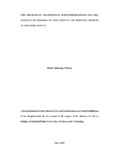| dc.contributor.author | Wekesa, Dinah Nakhungu | |
| dc.date.accessioned | 2021-05-21T09:50:22Z | |
| dc.date.available | 2021-05-21T09:50:22Z | |
| dc.date.issued | 2021-05 | |
| dc.identifier.uri | http://r-library.mmust.ac.ke/123456789/1463 | |
| dc.description.abstract | Religion, life and death are entwined and the knowledge of one requires the knowledge of the other. Religions have addressed the question of how one should live with awareness of inevitability of death. Consequently, societies have developed systems of belief and practice to help their people cope with the prospect of death and the attendant sorrow and grief. Drawing interest from the complex intertwine surrounding death and religion, the main problem of the study was to investigate the extent to which the Interphase between the Ababukusu traditional and Friends Church cultures with regard to widowhood had caused suffering to the widows. Examining death phenomenon from a gendered perspective, the main objective of the study was to assess the Interphase between Ababukusu traditional and Friends Church widowhood rites and rituals and how it subjugated the Ababukusu widow. The study was guided by structural functionalism by Emile Durkheim (1858 – 1917) and Herbert Spencer (1820 – 1903) and how it functioned abnormally from a gender perspective. Structural functionalism theory informed the study that the rites and rituals performed after death of husband enhanced solidarity and stability of the society, yet this was at the expense of the female gender. This study adopted a descriptive and explorative survey designs to describe the experiences of the widow after the death of a husband. Probabilistic and non-probabilistic sampling techniques were used that involved purposive and stratified random sampling. The study also used both library and archival materials. The main data collection instruments were questionnaires, interview schedules and observation method. The validity of instruments was established by expert assistance from the school of arts and social sciences (SASS) of Masinde Muliro University of Science and Technology (MMUST).This study found out that the Ababukusu widowhood rites and rituals repositioned widows in society as objects of men’s sexual desires and beings to be economically deprived. As the Friends Church watched and even supported tacitly as was the case in some instances, the traditional rites and rituals subjected widows to partriachial customs, discrimination on inheritance rights, isolation, psychological torture and caused them to suffer abuse in the context of ritual cleansing and suspicion of infidelity and complicity on the demise of the spouse. This study recommends the application of combined force of ubuntu values and Christian church compassion towards widows(Which appear to be non-functional) that provides the best opportunity for embracing Ababukusu Christian widows in particular and African Christian widows in general out of subjugation . The study advises in this regard that the rites and rituals should not be abandoned but instead be infused deliberately with humane values as befits ubuntu and biblical teaching of love and care with regard to widowhood. | en_US |
| dc.description.sponsorship | MMUST | en_US |
| dc.language.iso | en | en_US |
| dc.publisher | MMUST | en_US |
| dc.subject | Traditional, Widowhood, Rites, Effects, Widows, Religion. | en_US |
| dc.title | THE ABABUKUSU TRADITIONAL WIDOWHOOD RITES AND THE EFFECTS ON WIDOWS IN THE CONTEXT OF FRIENDS CHURCH IN WESTERN KENYA | en_US |
| dc.type | Thesis | en_US |

